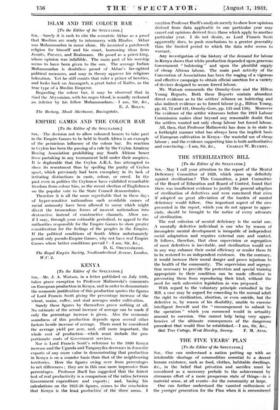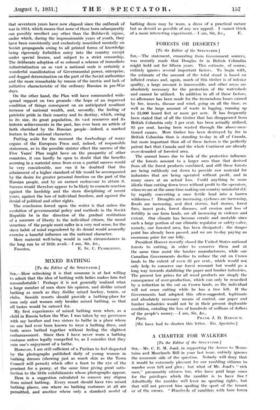THE -FIVE YEARS' PLAN [To the Editor of-the SPECTATOR.]
SIR, —One can understand a nation putting up with an intolerable shortage of commodities essential to a decent human existence, such as food, clothes, habitable dwellings, &c., in the belief that privation and sacrifice must be considered as a necessary prelude to the achievement by strenuous effort of a more prosperous state of things—in a material sense, at all events—for the community at large.
One can further understand the vaunted enthusiasm of the younger generation for the Plan when it is remembered
that seventeen years have now elapsed since the outbreak of war in 1914, which means that none of those born subsequently can possibly recollect any other than the Bolshevik regime, under which, during the impressionable years of youth, they have been consistently and exclusively nourished mentally on Soviet propaganda owing to all printed forms of knowledge being rigorously forbidden entry into the country except under special licence, and subject to a strict censorship. The deliberate adoption of so colossal a scheme of immediate industrialization on so vast a national scale is certainly a wonderful manifestation of Governmental power, enterprise, and dogged determination on the part of the Soviet authorities and the more remarkable by reason of the inertia and lack of initiative characteristic of the ordinary Russian in pre-War days.
On the other hand, the Plan will have commanded wide- spread support on two grounds—the hope of an improved condition of things consequent on an anticipated resultant increase of national wealth, and, secondly, the feeling of patriotic pride in their country and its destiny, which, owing to its size, its great population, its vast resources and its historic achievements in the past, has ever been an article of faith cherished by the Russian people—indeed, a marked feature in the national character.
Putting aside for the moment the forebodings of many organs of the European Press and, indeed, of responsible statesmen, as to the possible sinister effect the success of the Five Years' Plan might have on the prosperity of other countries, it can hardly be open to doubt that the benefits accruing in a material sense from even a partial success would be very considerable, nor can it be doubted that the attainment of a higher standard of life would be accompanied by the desire for greater personal freedom on the part of the Russian people, and by an earnest endeavour to attain it. Success would therefore appear to be likely to connote reaction against the hardship and the stern disciplining • of recent years, against the loss of individual freedom, and against the denial of political and other rights.
The conclusion forced upon the writer is that unless the evolution of governmental policy and methods in the Soviet Republic be in the direction of the gradual restitution of a measure of liberty to the individual citizen, the moral structure of the people must suffer in a very real sense, for the slave habit of mind engendered by its denial would assuredly exercise • a baneful influence on the national character.
Mere material well-being would in such circumstances in the long run be of little avail.—I am, Sir, &c.,



































 Previous page
Previous page